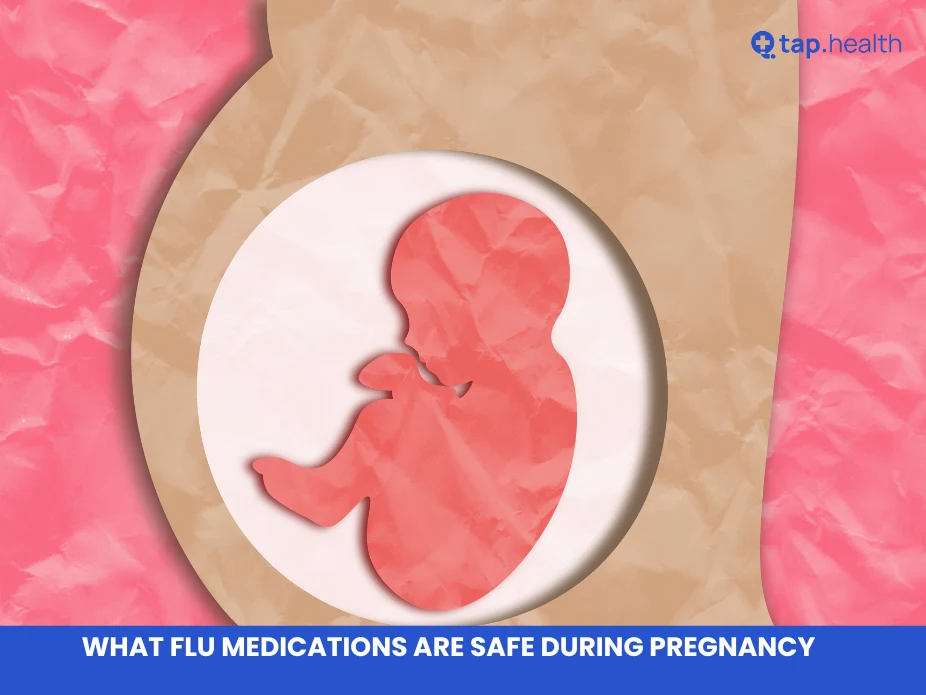Pregnancy is a time of joy, but it can also bring about some challenges—especially when you catch the flu. Flu season doesn’t take a break for anyone, and if you’re expecting, you might be wondering what flu medications are safe during pregnancy. This is a common concern, as not all medications are safe for you or your baby during this delicate time.
The good news is that there are ways to manage flu symptoms safely while you’re pregnant. In this blog, we’ll break down which flu medications are safe, natural remedies to help you feel better, and tips to prevent the flu altogether.
Understanding Flu During Pregnancy
Why Is Flu Dangerous During Pregnancy?
Pregnancy weakens your immune system to protect the baby, but this makes you more vulnerable to infections, including the flu. Flu can lead to complications like dehydration, pneumonia, or preterm labor. The risks are higher for women who are in their second or third trimester.
Symptoms of the flu include fever, chills, fatigue, body aches, sore throat, cough, and nasal congestion. If you’re pregnant and catch the flu, it’s important to get the right treatment to minimize any potential risks to you and your baby.
Safe Flu Medications During Pregnancy
1. Tamiflu (Oseltamivir)
Tamiflu is one of the most commonly prescribed antiviral medications for flu. According to the Centers for Disease Control and Prevention (CDC), Tamiflu is considered safe during pregnancy if prescribed by your doctor. It’s most effective when taken within the first 48 hours of flu symptoms and works by preventing the flu virus from spreading in your body.
However, it’s important to note that Tamiflu should only be used when necessary, as it’s typically prescribed to individuals at high risk of complications from the flu, such as pregnant women.
2. Relenza (Zanamivir)
Relenza, another antiviral medication, is also approved for use during pregnancy. It is inhaled, which makes it easier to use for women who may have trouble swallowing pills. Like Tamiflu, it works by inhibiting the flu virus from multiplying.
Relenza is a viable option for pregnant women who are diagnosed with the flu, especially if they are in the early stages of infection.
3. Acetaminophen (Tylenol)
For mild flu symptoms like a headache or body aches, acetaminophen (Tylenol) is considered safe during pregnancy. Unlike nonsteroidal anti-inflammatory drugs (NSAIDs) like ibuprofen, acetaminophen is generally safe to use throughout all stages of pregnancy, but always consult your doctor before taking any medication.
Acetaminophen can help reduce fever, which is important because a high fever during pregnancy can be harmful to your baby, especially during the first trimester.
4. Cough Medicines and Decongestants
Many over-the-counter cough medicines and decongestants contain ingredients like guaifenesin or pseudoephedrine, but these are often not recommended during pregnancy due to potential risks.
- Guaifenesin: While it is considered safe for use during pregnancy in some cases, it’s best to consult your doctor first.
- Pseudoephedrine: This decongestant is typically avoided in the first trimester as it can affect blood flow to the placenta.
For a more pregnancy-friendly option, you might want to try natural remedies like honey, ginger tea, or saline nasal spray to relieve symptoms.
Real-Life Scenarios
Scenario 1: Aarti’s Experience with the Flu During Pregnancy
Aarti, a 30-year-old woman from Bangalore, found herself suffering from flu-like symptoms during her second trimester. She had a fever, sore throat, and a headache, and was feeling incredibly fatigued. Worried about the safety of taking medications, she consulted her doctor, who prescribed Tamiflu to help treat the flu virus. Aarti was relieved to know that the medication was safe and effective, and with the help of acetaminophen for fever and body aches, she was able to recover quickly without any complications for her baby.
Scenario 2: Priya’s Natural Approach
Priya, 27, from Delhi, is in her first trimester and caught the flu just as the season began. She didn’t want to take any medication unless absolutely necessary, so she opted for natural remedies. She drank warm ginger tea with honey, used saline nasal spray to clear congestion, and rested a lot. Her flu symptoms were mild, and with the support of her healthcare provider, she was able to recover with minimal intervention.
Expert Contributions
Dr. Sushma Desai, an obstetrician and gynecologist based in Mumbai, shares her expert advice:
“Pregnant women should be cautious when taking medications, especially in the first trimester. If you catch the flu, it’s essential to seek medical advice. While some antiviral medications are safe, self-treatment can lead to complications. Always speak with your healthcare provider to ensure both you and your baby stay safe.”
Source: Indian Journal of Obstetrics & Gynecology
Recommendations Grounded in Proven Research and Facts
Here are the most important things to keep in mind when managing flu symptoms during pregnancy:
- Seek Early Treatment: If you suspect the flu, see your doctor early. The sooner you start antiviral treatment, the better the results.
- Stick to Safe Medications: Medications like Tamiflu and acetaminophen are considered safe, but always check with your doctor.
- Avoid Decongestants: While over-the-counter decongestants may seem appealing, they can have negative effects on your pregnancy, especially in the early stages.
- Hydrate and Rest: Flu symptoms are often worsened by dehydration, so make sure to drink plenty of fluids and rest as much as possible.
Factual and Reliable Information
- CDC Guidelines: According to the Centers for Disease Control and Prevention, Tamiflu is one of the antiviral medications that are considered safe to use during pregnancy for the treatment of flu.
- Antiviral Medications: Studies show that Relenza and Tamiflu can reduce the severity and duration of flu symptoms when taken early in the infection.
- Flu Vaccination: The best way to avoid the flu during pregnancy is by getting the flu shot, which is safe for most pregnant women and offers protection for both mother and baby.
FAQs
Q: Can I take flu medications while pregnant?
A: Yes, but you should only take medications that are approved for use during pregnancy. Always consult with your healthcare provider for advice.
Q: Is it safe to take Tylenol during pregnancy for flu symptoms?
A: Yes, acetaminophen (Tylenol) is generally considered safe for treating fever and body aches during pregnancy. However, it’s always best to consult your doctor.
Q: Are antiviral medications like Tamiflu safe during pregnancy?
A: Yes, Tamiflu is generally considered safe during pregnancy when prescribed by your doctor. It is most effective when taken early in the course of the flu.
Q: What can I do if I can’t take flu medication during pregnancy?
A: If you’re unable to take medication, focus on natural remedies like staying hydrated, using saline nasal spray, and resting. Always speak with your healthcare provider for alternatives.




